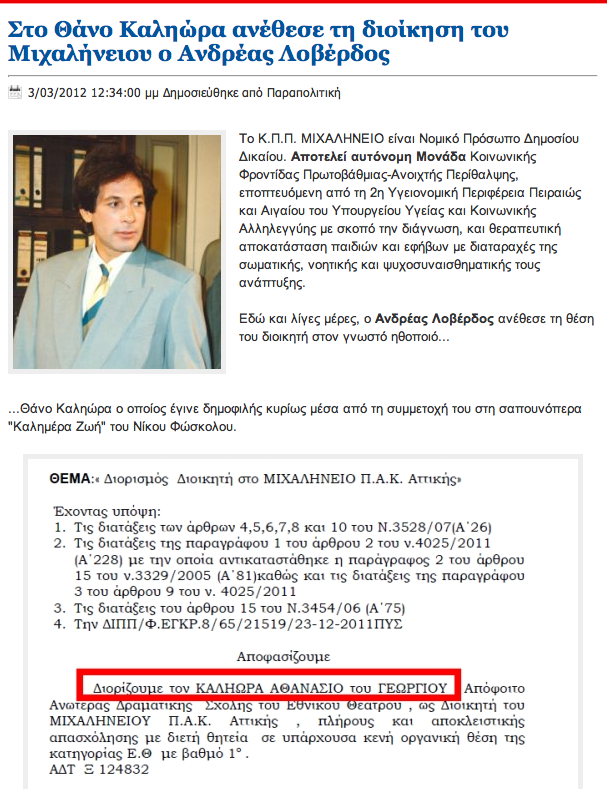Ο τραπεζίτης Λ. Παπαδήμος ξέρει να ανταμείβει όσους δουλεύουν πιστά για να μη μείνει τίποτε όρθιο από πλευράς κατακτήσεων του λαού και της νεολαίας. Σύμφωνα με το τηλεγράφημα της αμερικανικής πρεσβείας που έφερε στο φως της δημοιότητας το wikileaks λίγους μήνες πριν ο Γ. Μπαμπινιώτης έδινε ραπόρτο και ζητούσε τη βοήθεια της αμερικανικής πλευράς για την προώθηση της εκπαιδευτικής μεταρρύθμισης. Μεταξύ πολλών άλλων “ενημερώνει” (ποιόν ορισμό δίνει ο κ.καθηγητής για αντίστοιχες ενημερώσεις στην κατοχή;;) για την υπερπολιτικοποίηση της σπουδάζουσας νεολαίας που αποτελεί συνέχεια της αντιδικτατορικής πάλης και προκαλεί αναστάτωση στα Πανεπιστημιακά Ιδρύματα! Κάνει έντονες αναφορές στο άσυλο και τα ιδιωτικά Πανεπιστήμια, ενώ συμφωνεί με την εκτίμηση ότι η ανατροπή των συσχετισμών στην ΠΟΣΔΕΠ ανοίγει το δρόμο για επιτάχυνση των αντιδραστικών τομών. Η Πρεσβεία δείχνει να ενοχλήθηκε ιδιαίτερα από το πανεκπαιδευτικό μέτωπο της αγωνιστικής έκρηξης του ’06 – ’07 και οι πρόθυμοι τύπου Μπαμπινιώτη σπεύδουν να πάρουν τα μέτρα τους να μην ξαναενοχληθεί ο κ. Πρέσβης…Ας θυμηθούμε λοιπόν ποιος είναι ο νέος Υπ. Παιδείας:
Greek Education Reform Expert Wants U.S. Help
C O N F I D E N T I A L ATHENS 000407
FOR EUR/SE, EUR/PPD AND ECA
E.O. 12958: DECL: 2019/03/31
TAGS: PGOV, OPRC, OEXC, SCUL, GR
SUBJECT: Greek Education Reform Expert Wants U.S. Help
REF: ATHENS 260
CLASSIFIED BY: Daniel V. Speckhard, Ambassador, State, Executive;
REASON: 1.4(B), (D)
1. (C) Summary: In a March 26 meeting with PAO and CAO, Greek
education reform expert Babiniotis shared GoG plans and timelines,
and enthusiastically welcomed U.S. assistance on implementing a
national university entrance exam system based on the Scholastic
Aptitude Test (SAT). End summary.
2. (C) Prominent linguist, scholar, former rector of Athens
University (2000-2006) and GoG expert responsible for reforming the
Greek university entrance exam system, Professor George Babiniotis,
met with PAO and CAO on March 26. Babiniotis was candid about the
failings of the educational system in Greece, and the challenges to
implementing reforms.
3. (C) The current university admittance system is untenable,
Babiniotis said. Most parents and students view a university
degree as the ticket to advancement, which is the reason that more
than 100,000 students apply each year for the 40,000 university
slots. To be competitive, high school students concentrate on
private institution (frontistiria)-provided university preparatory
classes rather than their regular school classes. As a result
secondary students memorize material to pass the examinations
rather than really mastering subject matter. “We are graduating
aspiring university students rather than well-educated kids,” he
lamented.
U.S. Assistance on University Testing Needed
4. (C) Babiniotis wants to change the current university entrance
system to one similar to that in the U.S., based on a combination
of high school grades and performance on a standardized exam
similar to the SAT, which students can take whenever they feel
ready to do so, thereby minimizing the pressure on students and the
reliance on frontistiria. At present the future of each student
depends on the performance on the day of the entrance examination.
Greece needs to develop a data bank of questions and computer based
testing allowing students the freedom to take the examinations at a
date of their convenience and to take the examination more than
once. (Tests derived from data banks select by random a limited
number of questions for a particular examination out of the tens of
thousands of possible questions.) With a large data bank of
questions, each examination would be unique for each test taker,
making it almost impossible to cheat or memorize test questions in
advance. Babiniotis enthusiastically accepted PAO’s offer to
provide U.S. expertise on computerized testing as the GoG moves
down this path.
Prospects for Reform are Good
5. (C) According to Babiniotis, political prospects for
educational reform are improving. New Democracy and the opposition
PASOK parties are working together on a solution; Babiniotis has
seen PASOK’s proposals (reftel) and thinks they are “logical,” but
added that it is easier to push such reforms when in the
opposition. Babiniotis agreed that the elections for leadership
of the university teachers union (POSDEP), which ousted the
radicals supported by SYRIZA, was an indication that the university
community was eager for a change. Up to now the union had
supported all calls for strikes and disruptions of instruction at
the university. There is even support to reduce the percentage
from 40% of student representation in university decisions. There
is mounting pressure on both major parties from the public for
substantive reform, and soon.
6. (C) Primary school reform will be easiest, Babiniotis
predicted, while high school and university reform will be bigger
challenges due to political posturing and the politicization of
students. There needs to be a change in the mindset of the public,
which views university education as the only vehicle to
advancement. At the university level, Greece needs to scale back
on the number of institutions of higher learning – currently 23
universities and 15 technical schools (TEI) country-wide, according
to Babiniotis, while the remaining TEIs need to be strengthened to
meet the needs of the marketplace. A number of TEI need to be
incorporated into the departments of universities, Babiniotis said;
those universities, in turn, need more autonomy on decisions
related to budget, curriculum, enrollment and faculty.
University Problems: Politicization of Students and Abuse of
Asylum
7. (C) University students have become too politicized,
Babiniotis lamented, a holdover from the days of the military
dictatorship in Greece. This excessive politicization has caused
serious disruptions in university operations. Asylum is being
abused to the point where well-meaning students – the majority -
suffer in their pursuit of a higher education. While some students
turn to private education, their degrees are still not recognized
by the Greek state and, Babiniotis believes, will not be unless
there is broad political agreement to amend the Greek Constitution
to formally allow private education. While opposition PASOK leader
George Papandreou originally supported amending the constitution,
according to Babiniotis, he later backtracked and the issue of
private education remains unresolved.
8. (C) Comment: Babiniotis is a knowledgeable, respected
academic who knows the Greek educational system well and appears to
have support from both New Democracy and PASOK. Our meeting with
him, and his enthusiastic acceptance of our offer of U.S. help on
university entrance testing, has opened the door to U.S. input and
expertise on one of the most important reforms in recent Greek
history. In the coming months, Post will consult with the
Department on best ways to provide U.S. advice and assistance.
Ευχαριστούμε μεγάλε δάσκαλε του γένους
χούντα (η) [χωρ. γεν. πληθ.] (α) ομάδα πολιτικών που καταλαμβάνει την κυβερνητική εξουσία (για χώρες της Λατινικής Αμερικής) (β) (γενικότ.) ομάδα πολιτικών και στρατιωτικών που καταλαμβάνουν την εξουσία με πραξικόπημα και επιβάλλουν με τη δύναμη των όπλων δικτατορικό καθεστώς: η ~ των στρατηγών στην Αργεντινή || η ~ των συνταγματαρχών στην Ελλάδα (γ) (μτφ.) χαρακτηρισμός πολιτικής εξουσίας που ενεργεί αυταρχικά και δεν λαμβάνει υπόψη τη λαϊκή βούληση|
εξέγερση (η) [μτγν] {-ης κ. –έρσεως, –έρσεις, –έρσεων} η μαζική και δυναμική κινητοποίηση εναντίον οποιασδήποτε αρχής: η ~ του Πολυτεχνείου || ξέσπασε ~ ||ένοπλη ~ (λαϊκ.) ξεσηκωμός. ΣΧΟΛΙΟ λ. επανάσταση.
ανατροπή (η) 1. (α) το αναποδογύρισμα, η απώλεια της ισορροπίας και η πτώση (β) υδραυλικό σύστημα για την ανύψωση και το άδειασμα της καρότσας φορτηγών 2. (μτφ) η βίαιη πτώση, η κατάλυση (της υπάρχουσας τάξης, καθεστώτος, ηγέτη) η ~ του τύραννου 3. Η ριζική μεταβολή προς το αντίθετο ΣΥΝ αναστροφή 4. (μτφ) η απόδειξη ότι κάτι δεν ισχύει ΣΥΝ αντίκρουση, ανασκευή ΑΝΤ ενίσχυση, στήριξη, θεμελίωση 5.(μτφ) η ακύρωση, η ματαίωση: η ~ των σχεδίων κάποιου. |











 χα χα εγώ το στειλα στον τρολλιστη
χα χα εγώ το στειλα στον τρολλιστη
 Το αφιέρωμα στον σκηνοθέτη Βαγγέλη Κοτρώνη, έρχεται να κάνει γνωστή, τη δυναμική παρουσία ενός πολύ αξιόλογου δημιουργού, στο όνομα του οποίου, η μητέρα του, κυρία Νίνα Κοτρώνη, ίδρυσε το πολύ γνωστό στους κινηματογραφικούς κύκλους "Ιδρυμα Βαγγέλης Κοτρώνης" και μέσα απο το οποίο δημιουργηθήκε το "Φεστιβάλ Φανταστικού Κινηματογράφου" ταινιών μικρού μήκους που γίνεται σε ετήσια βάση στη χώρα μας.
Το αφιέρωμα στον σκηνοθέτη Βαγγέλη Κοτρώνη, έρχεται να κάνει γνωστή, τη δυναμική παρουσία ενός πολύ αξιόλογου δημιουργού, στο όνομα του οποίου, η μητέρα του, κυρία Νίνα Κοτρώνη, ίδρυσε το πολύ γνωστό στους κινηματογραφικούς κύκλους "Ιδρυμα Βαγγέλης Κοτρώνης" και μέσα απο το οποίο δημιουργηθήκε το "Φεστιβάλ Φανταστικού Κινηματογράφου" ταινιών μικρού μήκους που γίνεται σε ετήσια βάση στη χώρα μας. 